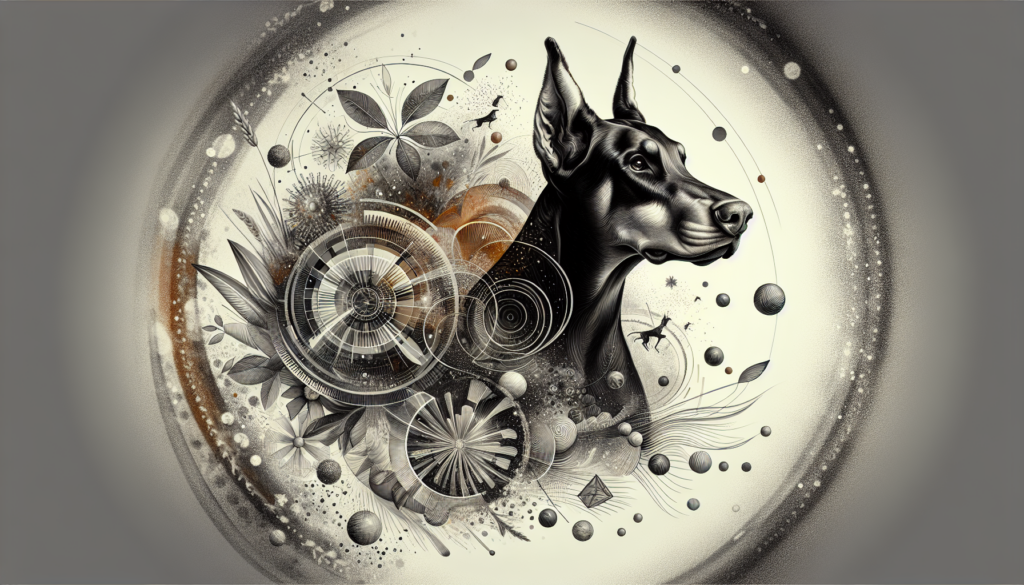You’re curious about the average life expectancy of a Doberman, and we’re here to provide you with the answer. A Doberman, known for its sleek and elegant appearance, captivates many dog lovers with its intelligence and loyalty. If you’re considering welcoming this breed into your family, it’s important to know how long they typically live. In this article, we’ll explore the factors that influence a Doberman’s lifespan and give you a clear understanding of what you can expect when sharing your life with this remarkable canine companion. So, let’s uncover the truth behind the average life expectancy of a Doberman!
Factors that Influence Doberman Life Expectancy
Dobermans are loyal and intelligent dogs known for their sleek appearance and protective nature. As a responsible dog owner, it is important to understand the various factors that can influence the life expectancy of a Doberman. By taking these factors into consideration, you can ensure that your furry friend lives a long and healthy life.
Genetics
Genetics play a significant role in determining the life expectancy of a Doberman. Like any other breed, Dobermans can inherit certain health conditions or diseases from their parents. It is crucial to choose a reputable breeder who conducts thorough genetic testing and focuses on breeding Dobermans with good genetic health. By selecting a Doberman with a strong genetic background, you can significantly increase their chances of living a longer life.
Healthcare
Providing proper healthcare for your Doberman is essential in maintaining their overall well-being and extending their life expectancy. Regular vet check-ups are crucial for monitoring their health and detecting any potential issues early on. Vaccinations and preventive care, such as flea and tick prevention and heartworm medication, are also important to protect your Doberman from common illnesses and parasites. Moreover, getting your Doberman neutered or spayed can have health benefits and can prevent certain cancers and infections.
Diet and Nutrition
A balanced diet is key to ensuring your Doberman maintains a healthy weight and receives all the necessary nutrients. High-quality dog food, specifically formulated for large breeds, is recommended to meet their nutritional needs. It is important to avoid overfeeding your Doberman, as obesity can lead to a multitude of health problems and decrease their life expectancy. Additionally, establishing a regular feeding schedule and monitoring their food intake can contribute to better digestion and overall health.
Exercise and Activity
Dobermans are high-energy dogs that require regular exercise and activity to stay physically and mentally stimulated. Daily exercise is crucial in preventing obesity and maintaining muscle tone. Long walks, jogging, and interactive play sessions are excellent ways to keep your Doberman active. Mental stimulation is equally important, as Dobermans are intelligent dogs that thrive on learning and solving puzzles. Engaging in training sessions, agility exercises, or providing them with interactive toys can help satisfy their mental needs.
Environmental Factors
The environment in which your Doberman lives can have a significant impact on their life expectancy. Creating a safe and comfortable living space for your furry friend is crucial. Ensuring that your home is free of hazardous plants, chemicals, and potential dangers can prevent accidents and injuries. Climate and temperature are also important considerations, as extreme weather conditions can be detrimental to your Doberman’s well-being. Furthermore, the choice of keeping your Doberman indoors or outdoors should be based on their individual needs and should provide adequate shelter and protection.

Average Life Expectancy of a Doberman
Dobermans have an average life expectancy of around 10 to 13 years. However, several factors can influence this range, either positively or negatively. By understanding these factors, you can make informed decisions and implement strategies to help increase the life expectancy of your Doberman.
Doberman Life Expectancy Range
The life expectancy of a Doberman can vary within the average range of 10 to 13 years. Some Dobermans may live longer, even up to 15 years or more, while others may have a shorter lifespan. Various factors can influence this range, including genetics, healthcare, diet, exercise, and the living environment.
Factors Affecting Life Expectancy
Several factors can significantly impact the life expectancy of a Doberman. It is important to consider each of these factors and make conscious decisions to prioritize your Doberman’s health and well-being.
Genetics and Inherited Diseases
Genetic factors can predispose Dobermans to certain inherited diseases or health conditions. These can include heart disease, hip dysplasia, von Willebrand’s disease, and certain cancers. Proper genetic testing of breeding dogs and responsible breeding practices can help reduce the risk of passing on these diseases to future generations of Dobermans.
Quality of Healthcare
Regular veterinary check-ups, vaccinations, and preventive care play a vital role in maintaining your Doberman’s health. Regular check-ups allow for early detection and treatment of any potential health issues, ensuring that your Doberman receives proper medical attention. Providing your Doberman with the necessary healthcare can significantly improve their overall well-being and life expectancy.
Diet and Nutrition
Proper nutrition is essential for a Doberman’s health and longevity. A well-balanced and high-quality diet helps provide the necessary nutrients, supports their immune system, and prevents obesity. Monitoring their food intake, avoiding excessive treats, and maintaining a healthy weight can positively impact their life expectancy.
Exercise and Mental Stimulation
Regular exercise is crucial for a Doberman’s physical health and mental well-being. Failure to provide adequate exercise can lead to obesity, muscle weakness, and behavioral issues. Engaging in daily walks, jogs, or play sessions not only keeps your Doberman physically fit but also provides mental stimulation and prevents boredom.
Living Environment
Creating a safe, comfortable, and stress-free living environment for your Doberman is essential. Ensuring their safety by eliminating potential hazards, managing their stress and anxiety levels, and providing a positive social and family environment can contribute to a longer and healthier life. A peaceful and supportive living environment positively affects your Doberman’s overall well-being and happiness.

Living Environment
The living environment you provide for your Doberman plays a crucial role in their overall well-being and life expectancy. By ensuring a safe, stress-free, and positive living environment, you can greatly contribute to your Doberman’s happiness and longevity.
Safety and Comfort
Creating a safe living environment is of utmost importance. Keeping hazardous substances, chemicals, and plants out of your Doberman’s reach reduces the risk of accidental poisoning or injury. Providing comfortable bedding and appropriate shelter, both indoor and outdoor, offers your Doberman a sense of security and protection.
Stress and Anxiety Management
Managing your Doberman’s stress and anxiety levels is essential for their mental and emotional well-being. Dogs, including Dobermans, can experience stress due to various factors such as separation anxiety, loud noises, or changes in their routine. Providing a structured routine, positive reinforcement training, and ensuring they have a safe space to retreat to can help alleviate stress and anxiety.
Positive Social and Family Environment
Dobermans are social and loyal dogs that thrive in a loving and supportive family environment. Regular socialization with other dogs and exposure to various people and environments is crucial for their mental and emotional development. Ensuring your Doberman feels loved, cared for, and part of the family strengthens the bond and contributes to their overall happiness and well-being.
In conclusion, while the average life expectancy of a Doberman is around 10 to 13 years, various factors can influence this range positively or negatively. By prioritizing factors such as genetics, healthcare, diet and nutrition, exercise and activity, and the living environment, you can significantly increase the chances of your Doberman living a long and fulfilling life. Remember, it is your responsibility as a dog owner to provide the necessary care, love, and attention needed to ensure your Doberman’s health and well-being throughout their lifespan.
